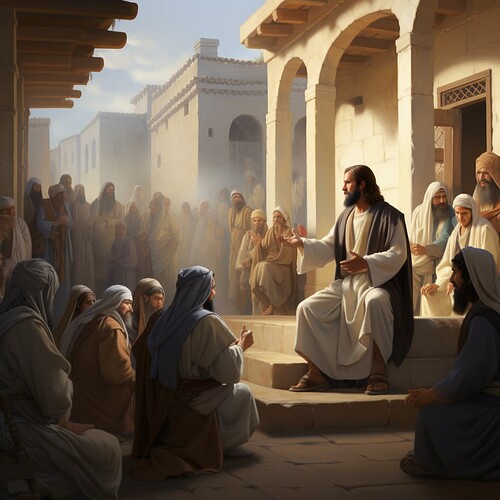![]() January 13: Matthew 15: Challenging Traditions and Embracing Faith
January 13: Matthew 15: Challenging Traditions and Embracing Faith
Exploring the Teachings of Jesus on True Purity and Faith
 Introduction
Introduction
On January 13th, we delve into Matthew 15, a chapter that presents a profound examination of tradition, purity, and faith. Here, Jesus challenges prevailing religious norms and emphasizes the importance of inner purity and genuine faith.
 Matthew 15:1-20: The Heart of the Matter
Matthew 15:1-20: The Heart of the Matter
In the first section of Matthew 15, Jesus confronts the Pharisees and scribes on their adherence to human traditions over God’s commandments. He teaches that true defilement comes not from external sources but from the heart, reshaping the understanding of purity and obedience.
Key Verse: “But the things that come out of a person’s mouth come from the heart, and these defile them.” — Matthew 15:18
 Matthew 15:21-28: The Faith of a Canaanite Woman
Matthew 15:21-28: The Faith of a Canaanite Woman
This passage narrates the encounter between Jesus and a Canaanite woman, who shows remarkable faith in seeking healing for her daughter. Her faith and persistence lead to her daughter’s healing, highlighting that faith transcends cultural and ethnic boundaries.
Key Verse: “Woman, you have great faith! Your request is granted.” — Matthew 15:28
 Matthew 15:29-39: Feeding the Four Thousand
Matthew 15:29-39: Feeding the Four Thousand
The chapter concludes with the miracle of feeding the four thousand. This event, like the earlier feeding of the five thousand, demonstrates Jesus’ compassion and power to provide, reinforcing His identity as the provider and sustainer.
Key Verse: “They all ate and were satisfied, and the disciples picked up seven basketfuls of broken pieces that were left over.” — Matthew 15:37
 Key Themes and Reflections:
Key Themes and Reflections:
Inner Purity Over External Rituals: Jesus challenges the traditional understanding of purity, teaching that what comes from the heart is more important than external observances.
Faith Beyond Boundaries: The story of the Canaanite woman illustrates that true faith is not limited by cultural or ethnic barriers.
Jesus as the Provider: The feeding of the four thousand reaffirms Jesus’ role as a compassionate provider, capable of meeting the needs of the multitude.
 Today’s Application:
Today’s Application:
Reflect on the importance of focusing on inner purity and the intentions of your heart. Consider how your faith might transcend traditional boundaries and prejudices. Recognize Jesus’ role as the provider in your life and the lives of those around you.
 Hidden Gem:
Hidden Gem:
Did you know? The encounter with the Canaanite woman is a pivotal moment that showcases the inclusivity of Jesus’ ministry, opening the way for Gentiles to be part of God’s kingdom.
 Reflective Q&A:
Reflective Q&A:
![]() Challenging Religious Norms
Challenging Religious Norms
![]() How does Jesus’ teaching on inner purity challenge our own spiritual practices and beliefs?
How does Jesus’ teaching on inner purity challenge our own spiritual practices and beliefs?
A: Jesus’ teaching prompts us to examine our priorities, asking whether we focus more on outward religious rituals or on cultivating a pure heart and genuine relationship with God.
![]() The Faith of the Canaanite Woman
The Faith of the Canaanite Woman
![]() What can we learn from the Canaanite woman’s example of faith and persistence?
What can we learn from the Canaanite woman’s example of faith and persistence?
A: Her example teaches us the value of persistent faith and the courage to seek God’s help, even when it seems we are facing rejection or are outside the traditional boundaries of faith.
![]() Feeding the Multitudes
Feeding the Multitudes
![]() What does the miracle of feeding the four thousand reveal about Jesus’ character and mission?
What does the miracle of feeding the four thousand reveal about Jesus’ character and mission?
A: This miracle reveals Jesus’ compassion and ability to provide abundantly. It underscores His mission to care for both the spiritual and physical needs of the people.
 Join the Discussion:
Join the Discussion:
How do the teachings and actions of Jesus in Matthew 15 impact your understanding of faith, purity, and provision? Share your thoughts and insights in the comments below!
#Matthew15 #JesusTeachings #Faith #Purity #BibleStudy #SpiritualJourney #Miracles
![]() See You Tomorrow in Matthew: Continue your enlightening journey with us as we explore more profound teachings and miracles of Jesus in the Gospel of Matthew.
See You Tomorrow in Matthew: Continue your enlightening journey with us as we explore more profound teachings and miracles of Jesus in the Gospel of Matthew.
 Join the forum!
Join the forum!
Participate in our AIgniteScripture Community for in-depth biblical discussions and insights:
Free Members: Engage in meaningful conversations, access a rich library of biblical resources, and connect with fellow seekers. Join here: 🌟 How to Join Page - Membership Options
Supporters Membership ($20/month or $200/year): Get exclusive access to advanced studies, newsletters, and a community that deepens your faith. Become a Supporter: 🌟 How to Join Page - Membership Options
![]() Stay Connected with our AIgniteScripture Newsletter: Stay updated with daily readings and insights. Be part of a community that explores the Bible with AI-enhanced perspectives. Subscribe here: https://newsletter.aignitescripture.com/
Stay Connected with our AIgniteScripture Newsletter: Stay updated with daily readings and insights. Be part of a community that explores the Bible with AI-enhanced perspectives. Subscribe here: https://newsletter.aignitescripture.com/
